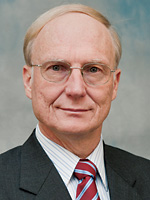Edward G. Tiedemann Jr.
Senior Vice President of Engineering and Qualcomm Fellow
Qualcomm Inc.
MSEE 1977
In recognition of his technical and management success and his outstanding support of education
It all started with lunch at a Chinese restaurant. Ed Tiedemann sat across the table from Andy Viterbi in Cambridge, Mass., to discuss a start-up company called Qualcomm, which Viterbi had just cofounded with Irwin Jacobs. It was 1986, and Tiedemann was completing his PhD while working at MIT’s Lincoln Laboratory.
Two years later with PhD in hand, Tiedemann took the plunge and moved to San Diego to join Qualcomm. “The company only had about 160 employees at the time,” he says. “We basically were a group of good technologists who wanted to do fun things and get paid for it.”
Qualcomm, whose core business is digital wireless telecommunications products and services for the cellular industry, now has more than 17,500 employees and annual revenues of $10.98 billion. Much of its business is based on code division multiple access (CDMA) technology, which Tiedemann helped design in his first years at the company.
“Analog was the predominant cell phone platform in the early 1990s, and it had many problems,” Tiedemann says. “Using spread-spectrum techniques, we pioneered CDMA, a digital technology, and were able to have 10 times more capacity than analog and to substantially increase call quality.”
Tiedemann then went on to lead Qualcomm’s standardization of CDMA. In the late 1990s, he led the creation of CDMA2000, a third-generation wireless system. Other third-generation technologies also were emerging at this time, a chaotic period that Tiedemann describes as the “3G wars.” However, when things settled down, CDMA2000 and WCDMA, which is based upon CDMA, were the two main systems remaining.
Promotions and other recognition followed for Tiedemann, as well as an opportunity to help start a Qualcomm office in New England. He jumped at the chance – because he missed the trees, the history, even the winters of Boston – but he never really moved.
“I still have my house in San Diego, and now I have a 300-year-old house in Concord, Massachusetts. But because I travel internationally so often, people tell me, ‘You’re crazy. You spend more time on planes than you spend in your houses.’ And they’re probably right.”
In his spare time, Tiedemann has devoted a good deal of energy to supporting engineering education. He previously has served on advisory boards at Virginia Tech, where he received his bachelor’s degree, and currently he serves on the advisory board for Purdue’s School of Electrical and Computer Engineering.
“I believe universities are the key to our economic well-being in the United States,” he says. “Plus, I guess I’m a person who develops a bit of loyalty to organizations. I have an old-school sense of duty, so I feel a responsibility to provide value and expertise back to the universities I attended.”
Career Highlights
| 2007-present | Senior Vice President of Engineering and Qualcomm Fellow, Qualcomm Inc. |
|---|---|
| 1998-2007 | Senior Vice President of Engineering, Qualcomm Inc. |
| 1988-1998 | Various positions, Qualcomm Inc. |
| 1977-1988 | Staff Member, MIT Lincoln Laboratory |
| 1987 | PhD, Electrical Engineering and Computer Science, Massachusetts Institute of Technology |
| 1977 | MSEE, Purdue University |
| 1975 | BSEE, Virginia Polytechnic Institute and State University |

